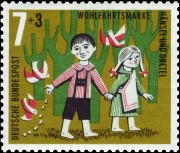|
Home
|
Oct 25, 2021
This week’s themeWords coined after fairy tales and folktales This week’s words breadcrumb Tom Thumb Domdaniel Chicken Licken open sesame 
Hansel & Gretel leaving breadcrumbs
Image: Deutsche Bundespost / Wikimedia
A breadcrumb trail on a website
Image: Douglas Mut Previous week’s theme Eponyms A.Word.A.Day
with Anu GargFairy tales and folktales, we grew up listening to them. They were mere amusements, or not. Latest research has quantified the benefits of listening to stories. Stories we grow up hearing take root in our collective consciousness. Many of the characters, places, concepts, and utterances have become part of the language. This week we’ll look at five of them. breadcrumb
PRONUNCIATION:
MEANING:
noun: 1. A small fragment of bread. 2. One in a series of markers placed as a navigational aid. 3. One of several hints or clues leading to a person, place, etc. ETYMOLOGY:
From bread, from Old English bread + crumb, from Old English cruma.
Earliest documented use: 1519.
NOTES:
In the fairy tale of Hansel and Gretel, their parents drop the
two siblings off in the forest because they are not able to feed
them (if only there had been a strong social safety net). The smart kids drop
breadcrumbs along the way so they can trace their steps back and find
their way home. In computing, website design, etc., breadcrumbs help users as a navigation aid and tell them where they are in a program, website, etc. USAGE:
“He leads you around with a trail of almost imperceptible breadcrumbs
into worlds you never knew existed.” Kit de Waal; John le Carré Remembered by Writers and Friends; The Guardian (London, UK); Dec 15, 2020. See more usage examples of breadcrumb in Vocabulary.com’s dictionary. A THOUGHT FOR TODAY:
Those who compare the age in which their lot has fallen with a golden age
which exists only in imagination, may talk of degeneracy and decay; but no
man who is correctly informed as to the past, will be disposed to take a
morose or desponding view of the present. -Thomas Babington Macaulay,
author and statesman (25 Oct 1800-1859)
|
|
Subscriber Services
Awards | Stats | Links | Privacy Policy
Contribute | Advertise
Awards | Stats | Links | Privacy Policy
Contribute | Advertise
© 1994-2026 Wordsmith